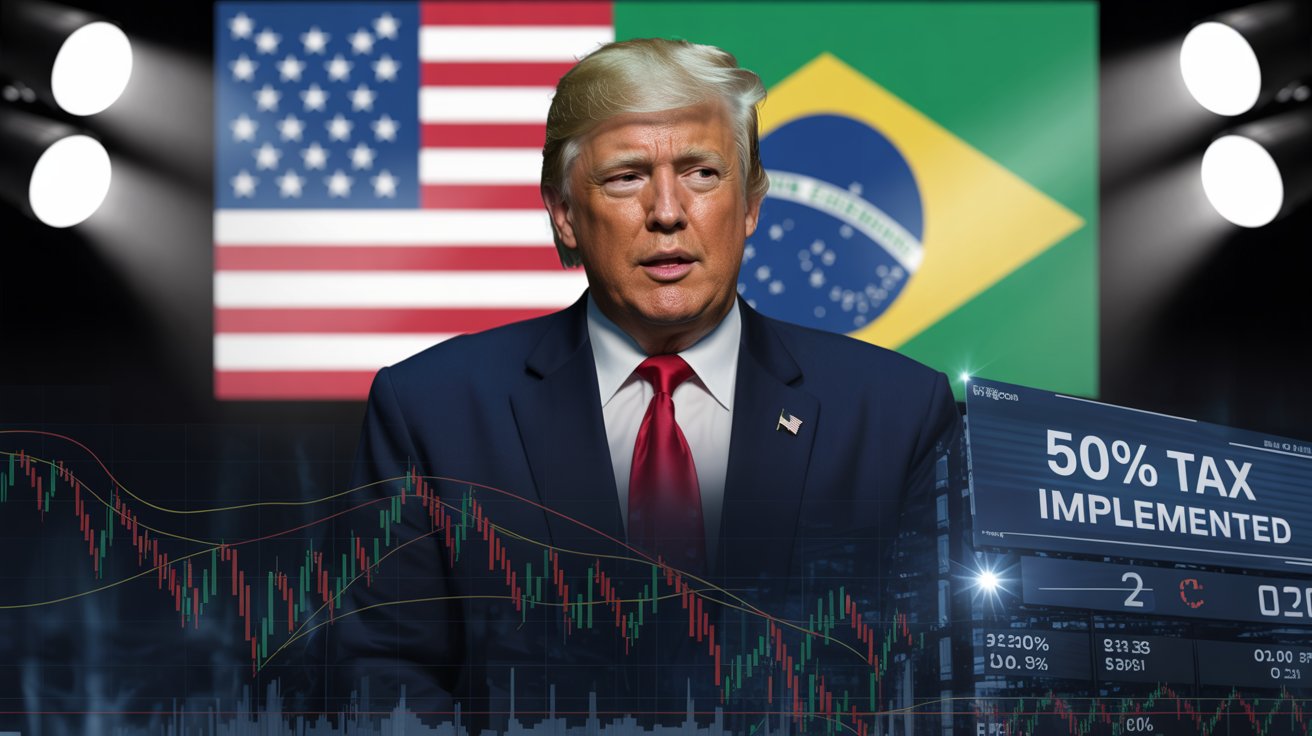
The global financial market is once again facing turbulence. With Donald Trump’s new economic policy proposal of a 50% tax on Brazilian exports, investors are asking: How will this affect my money, especially in fixed-income and variable-income investments?
If you invest in Treasury Bonds, Fixed Income Funds, Stocks, or Brazilian Companies listed abroad, this tax can directly impact your portfolio. Let’s break it down.
1. What Does a 50% Tax on Brazil Mean?
Trump’s proposal aims to “protect the American market” by heavily taxing Brazilian products such as steel, soy, oil, and meat. This would increase export costs, reduce Brazilian competitiveness, and potentially hurt the economy.
The immediate consequences include:
- Devaluation of the Brazilian Real (BRL).
- Lower growth prospects for exporting companies.
- Increased market volatility in stocks and bonds.
2. Impact on Fixed-Income Investments
If you hold fixed-income assets such as Tesouro Direto, CDBs, LCIs, and LCAs, here’s what you can expect:
- Higher interest rates: If the economy slows, inflation may rise, forcing the Central Bank to raise interest rates again. This benefits Tesouro Selic and new fixed-income issuances, which will pay more.
- Short-term gains: Investors who reinvest in new fixed-income securities could lock in higher yields.
- Mark-to-market losses: Those who already hold long-term fixed-income bonds (IPCA+ 2035, 2040, etc.) may see price drops in the short term.
👉 For conservative investors, the best strategy could be shorter-duration fixed-income assets that protect against volatility.
3. Impact on Variable-Income Investments
The stock market will feel the shock the most. Here’s how:
- Export companies (Vale, Petrobras, JBS): Directly affected by higher tariffs, which could lower profits.
- Domestic companies: Some may benefit if the weaker Real increases local demand for domestic products.
- Foreign investors: With higher uncertainty, many may pull money out of Brazil, creating volatility in B3 (Brazilian Stock Exchange).
👉 For bold investors, market corrections may open opportunities to buy discounted shares, but risks remain high.
4. Dollar and International Diversification
The Real could devalue sharply. For investors, this means:
- Holding dollars or dollar-based assets (ETFs, ADRs, crypto) becomes a hedge.
- International diversification is no longer optional — it’s essential.
5. What Should Investors Do Now?
- Stay calm: Panicking is the worst financial decision.
- Diversify: Keep part of your money in fixed-income, stocks, and international assets.
- Protect against the dollar: Holding some U.S. assets will safeguard your portfolio.
- Think long-term: Turbulence creates opportunities for disciplined investors.
Final Thoughts
Trump’s 50% tax on Brazil is a strong political move with direct consequences on your investments. Fixed-income assets may offer higher yields, while variable-income assets will face short-term pain but long-term opportunities.
Smart investors don’t fear volatility — they adapt. The key is diversification, patience, and strategic positioning.
Trump tax Brazil, Trump 50% tax, fixed-income investments 2025, variable-income investments, how Trump affects Brazil economy, Brazilian stock market 2025, Trump economic policy Brazil, how to make money investing 2025, fixed income vs variable income, investing during political crisis